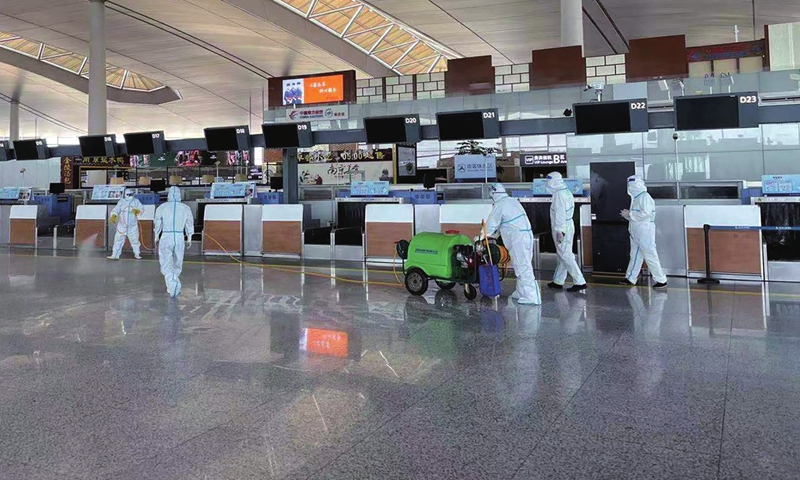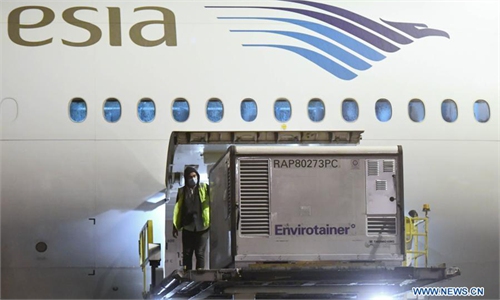
Staff members carry out sterilization work at the Terminal 2 of Nanjing Lukou International Airport in Nanjing, East China’s Jiangsu Province on Wednesday after 17 airport workers tested positive for the COVID-19. Photo: Xinhua
Nanjing Lukou International Airport started emergency testing for more than 15,000 staff members on Tuesday night. No positive results had been found as of press time but the testing is still ongoing, according to Nanjing government officials, who spoke at a press conference on Wednesday at noon.
Jiangning district, where the airport is located, launched mass testing at 9 am Wednesday. The district, with more than 1.9 million permanent residents, was expected to finish sample collection on Wednesday, said officials.
Four residential communities and villages near the airport were raised to medium-level risk areas. The affected streets close to the airport have been sealed off, and nearly 98,000 people living on those streets have been tested.
The Global Times learned from several testing centers in Jiangning that the testing centers were fully packed all day. Other districts in the city also saw residents lining up to get tested. "Six hours in queue in burning weather with a 30 degree temperature - everyone seems to be in hurry to get it done," said Chuchu, a resident from Jianye district.
Authorities announced on Wednesday evening that citywide testing was launched for more than 9 million residents in Nanjing.
Starting on Wednesday, a certificate with negative nucleic acid test results taken within 48 hours is required for departure from Nanjing airport and at railway and highway stations in the city. All public transportation has been suspended for the medium-risk regions.
As of press time on Wednesday night, more than 760 inbound and outbound flights had been canceled, with the real-time on-time entry and departure rates being 3 percent and 2 percent, respectively, according to data from Variflight.com, an online aviation information platform.
Nanjing authorities said on Tuesday night that nine staff members at the airport had tested positive for COVID-19. The number of positive cases detected was later updated to 17, including nine confirmed cases and eight asymptomatic patients.
All of the 17 patients are cleaning staff at the airport and were found to be COVID-19 positive during a regular nucleic acid test, according to the press conference.
The cluster may be a small "super transmission event," in which some cleaning staff members may have been infected by imported cases or contaminants and then spread the virus to others, Jin Dongyan, a professor at the School of Biomedical Sciences at the University of Hong Kong, told the Global Times on Wednesday.
Questions linger among the public about whether the 17 were fully vaccinated and if yes, how were they infected?
Yang Zhanqiu, deputy director of the pathogen biology department at Wuhan University, pointed out that even if they were fully vaccinated, it is possible that their antibody levels were not high enough to resist the virus, which may very likely be an imported mutant strain.
Jin suggested that people in the high-risk group, including airport staff, should be tested for antibodies to COVID-19, and be given a booster injection as soon as possible to boost their immunity if the levels were low.
He also noted that the fact that the positive cases were found during regular testing at the airport showed that the airport's system works, but it was still not sufficiently sensitive since 17 people had already been infected. He suggested that airports should consider testing staff more frequently.
Infections of airport staff previously occurred at Shenzhen Bao'an International Airport in June and Shanghai Pudong International Airport in November 2020, where the cases were all found to be associated with international flights.
The airport outbreak in Nanjing is highly likely to be related to imported cases, Fang Zhongyou, director of Nanjing Municipal Health Commission, said at Wednesday's press conference. But he noted that further investigation is still needed to identify the source and transmission route of the virus.


